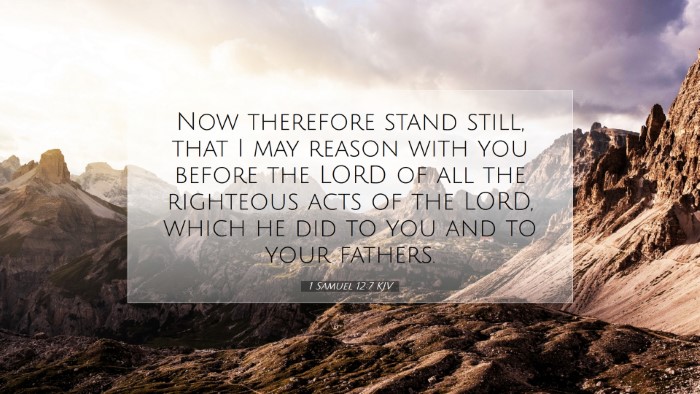Commentary on 1 Samuel 12:7
Verse: "Now therefore stand still, that I may reason with you before the LORD of all the righteous acts of the LORD which he did to you and to your fathers."
Introduction
This verse occurs in a critical moment of Israel's history, where Samuel addresses the people after they have requested a king. It serves as a reminder of God’s sovereignty and the faithfulness of His acts throughout history. Here we delve into a multi-faceted commentary derived from public domain resources, highlighting the theological, historical, and practical implications of this crucial verse.
Contextual Understanding
To fully comprehend 1 Samuel 12:7, it is necessary to consider the surrounding narrative. Israel had demanded a king, which implied a rejection of God's direct rule. Samuel, the prophet and judge, calls the people to reflect on God’s righteous acts—an invitation both to recognize their past and to reconsider their present trajectory.
Historical Background
The history of Israel leading up to this moment is pivotal. God delivered His people from Egypt, established their covenant, and provided leaders such as judges. However, the people's desire for a monarchy reflected a deeper spiritual crisis—a longing for worldly security rather than reliance on divine authority. Samuel's call to "stand still" not only invites them to pause but also to engage in self-reflection about their choices.
Theological Insights
From a theological standpoint, Samuel’s reasoning with the Israelites underscores the attributes of God’s character—His faithfulness, justice, and righteousness. The phrase "righteous acts" highlights God's moral excellence and his consistent action in the lives of His people. It is vital to note that God does not act arbitrarily; His acts are founded in justice and righteousness.
The Role of Remembrance
Samuel’s call to recount God’s past interventions is a common biblical theme that serves both a didactic and a reflective purpose. As noted by Matthew Henry, the recalling of past deliverances serves to strengthen faith and encourage obedience. By remembering the ways in which God has historically intervened, believers foster a deeper trust in His current and future actions.
Exegesis of Key Terms
Understanding the key terms in this verse enriches the overall interpretation:
- Stand still: This command goes beyond physical immobility; it suggests a state of spiritual attentiveness. It is a call to assess their spiritual condition and fate in light of God's historical dealings.
- Reason: The term implies an intellectual and moral appeal to the people’s understanding. Samuel desires them to engage in a dialogue with God’s past acts, emphasizing a rational examination of their decisions.
- Righteous acts: This phrase encapsulates the nature of God's actions; they are grounded in His character, signifying that everything He does is just and good.
Practical Applications
The implications of 1 Samuel 12:7 extend into personal and congregational life today:
Reflection on Leadership
Pastors and leaders are called to guide their congregations by continually reminding them of God’s faithfulness, much like Samuel did with Israel. Through preaching and teaching, leaders can invoke the rich history of God's acts as a foundation for faithfulness in contemporary issues.
Encouragement in Trials
For individuals and believers facing trials, reflecting on God's "righteous acts" brings comfort and encouragement. In moments of uncertainty, remembering God's past provision can bolster faith and present decision-making.
Community Reflection
This verse challenges worshipping communities to engage in corporate remembrance. Regular testimonies of God's faithfulness can foster a culture of gratitude and trust within the church’s collective heart.
Conclusion
1 Samuel 12:7 serves as a theological anchor that invites reflection on God’s righteousness and His interactions with His people. It compels believers to stand still, to think critically about their past, their faith journeys, and their reliance on God’s sovereign will. In doing so, they find strength not just in the history but in the very character of God who is unchanging and ever faithful.


